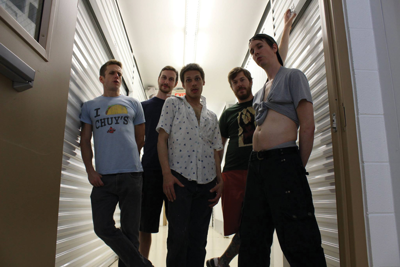"First, you've got a pirate in a lake antagonizing these centaurs."
Barry Donegan, lead singer for long-running Nashville prog-punks Look What I Did, is on the phone with the Scene, explaining the sprawling, planet-hopping storyline for his band's latest rock opera, Zanzibar III: Analog Prison. While Donegan and his crew have always stood out from the pack, taking typical Nashville technicality and turning it into a Dadaist whirlwind of sounds and styles, with Zanzibar they've completely obliterated any connection they may have had to Music City's songwriting hive mind. There are no Daisy Dukes, no dancing in headlights and no cheap domestic beer. There is, however, an army of 8-foot-tall green men on the moon.
"I like taking things you already know about and representing them in a story in a way that's disorienting," Donegan explains. "So in this universe, in 19th century Mormonism, there are noncanonical beliefs that said Brigham Young might live on the moon and there are 8-foot green men. And I wanted that to be true. ... And David Koresh lives on the moon, too."
It is a bizarre premise, to be sure, but over the course of Zanzibar's seven songs it actually makes sense. Transforming a head-scratching proposition to an engaging narrative that's part comic book adventure and part political treatise with a love story sprinkled in, the album's founded on remarkably catchy and impressively diverse songwriting. On paper, Zanzibar may seem like a dense, virtually impenetrable exercise, but coming out of the stereo speakers the conceptual weirdness and the band's musical ADD doesn't let you turn away. Tracks like "Wait, Don't Jump" and "The Trial" veer between anthem and art experiment with a speed and proficiency that is both absurd and awe-inspiring.
"At first it was kind of a joke, because 'Zanzibar I' and '[Zanzibar] II' are songs on our earlier albums and they kind of lead up to this," Donegan explains. "By the time we did a whole record of it, with the complexity of the political conflict between forces and everything, some of the initially jokey elements are even weirder now that there are more serious elements to the storyline. ... It got kind of deep over the course of it all. I wound up developing a court system in one song, and over the course of it you can see how unfair it is."
Donegan, cognizant that this is not a component of normative Nashville songwriting, laughs as he explains his fictional judicial system. Over the course of the band's almost-15-year run, they've never quite fit in with what the rest of what Music City was doing. It's a point of pride and a motivating factor for a group of guys who have navigated all the normal pitfalls of being an independent band in the 21st century. From label issues and L.A. adventures to figuring out how to meet the constant demand for content, Look What I Did has persevered through one of the most difficult eras in the recording age and come out a stronger, more exciting band, expanding creatively in both depth and range.
"I've always written one sort of way when it comes to lyrics," says Donegan. "[On this album] I was able to write a love song, which I don't really have love-song-type experiences in my life. It's just not something I would naturally write about, but when I'm looking at a storyline, and I've got a hero and a love interest, I can dig into that character and put myself in their shoes. There are some really passionate, deep moments."
That Donegan and his crew can make you empathize with a frickin' centaur, that they have created a world in which you may actually worry about the fate of Brigham Young and his army of moon men, is a testament to the quality of the writing. It's one thing to elicit an emotional response with universal truths about love and life and all the usual crap — it's another to make the listener feel the humanity in a hero who is half horse.
"When we make songs we put a lot of music per square inch," says Donegan. "We do that to be comical or be agitating. And after we got tired of that, we wanted to do something with a more compounding effect, so we switched gears."
Email music@nashvillescene.com





